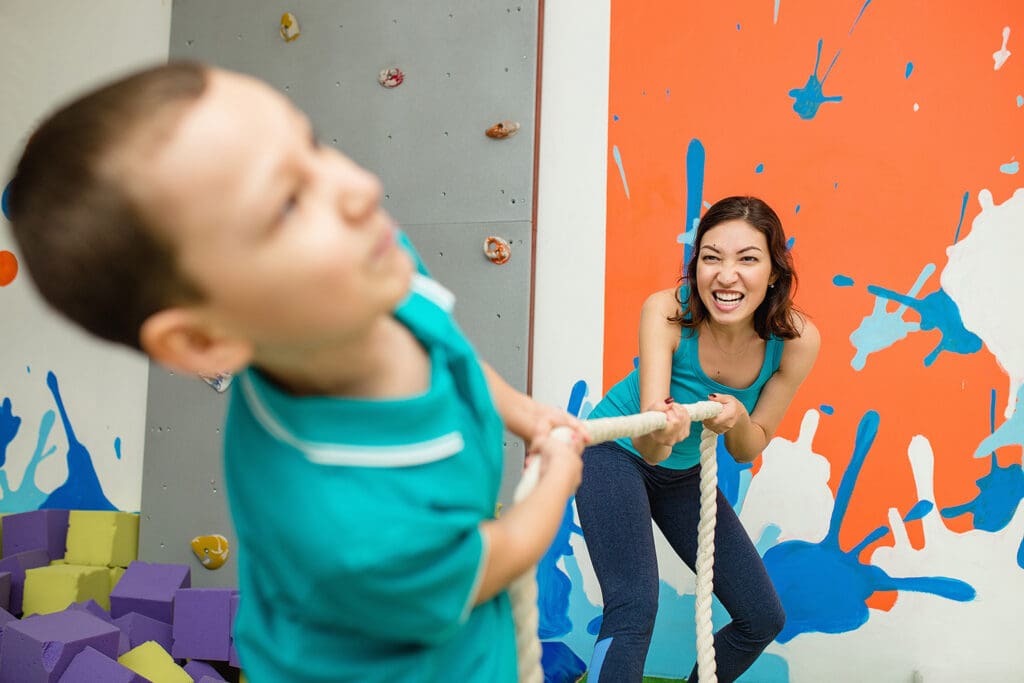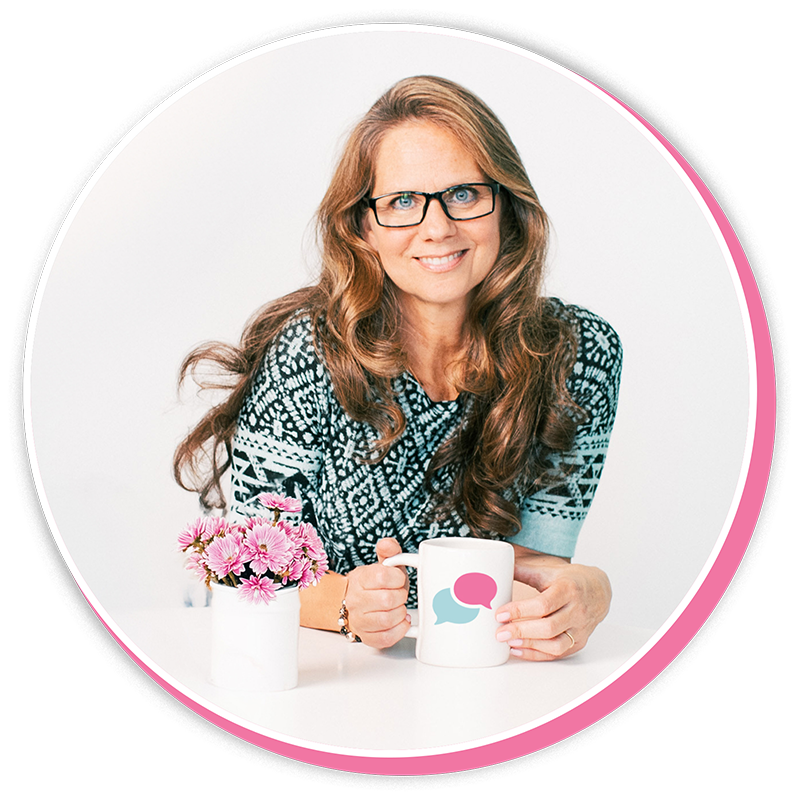Complete Guide: Responsive Parenting
When it comes to parenting, there is no one-size-fits-all approach. Every child and every family is different, and so the way we parent needs to be tailored accordingly....
Parenting Without Giving a F^ck >>> [BUY THE BOOK NOW]
 You wake up every day with the best intentions.
You wake up every day with the best intentions.
But, with kids, it’s inevitable that your day won’t go quite as smoothly as you planned.
Your kids horse around and knock over your favorite vase.
Your toddler has decided they want milk in the blue cup today, not apple juice in the red cup, and tells you so by throwing it on the floor, spilling juice all over.
You take a deep breath.
You try to stay calm.
Then something else happens that pushes you past the tipping point… and you yell.
The room goes quiet, your child looks scared, and guilt rushes in immediately.
You go to bed that night saying, tomorrow will be different.
If you want to know how to stop yelling at your kids, you’re in the right place.
Learning how to manage frustration and conflict is so important because tomorrow comes with the same behaviors, stress, and triggers.
If you want to learn how to stop yelling at your kids and reduce conflict at home, keep reading.
In this article, you’ll learn:
If you want to learn about parenting without yelling, let’s start by understanding what we (as parents) can control.
Before we get into the five simple ways you can stop yelling at your kids, let’s first look at why parents yell, how it becomes a habit and what you really have control over.
Yelling feels terrible but at the root of it, it’s often just the way we deal with parenting overwhelm or stress in our lives. When stress builds, patience runs thin, and your brain shifts into survival mode because your nervous system reacts.
Yelling becomes a habit easily when you don’t have alternative parenting techniques and you don’t know what else to do. You probably learned to be a parent from your childhood – seeing what the adults in your life did. The problem is that those methods are outdated. They rely on fear and control, so they break down real fast.
The calmer and more consistent you are, the faster your child learns to do the same. They do what we do. Learning how to stop yelling isn’t about being the perfect parent; it’s about being more intentional, trying something new, shifting your perspective and learning how to invite connection.
It’s possible to stop yelling at your kids but first, it’s so important to understand what you (as the parent) actually have control over in any given situation.
I have a core philosophy that is the foundation for anyone who wants to stop yelling at their kids. It’s that you can’t force calm into your home by micromanaging and controlling your kids. It starts by leading. The moment you shift your focus inward, the tone of your entire household begins to change.
I often tell parents I work with to use this phrase, “I’m only in charge of me, I’m not in charge of you.” This mantra helps you remember that you can only control your choices and when you change yourself, your child will change right behind you.
This isn’t just feel-good advice.
It’s neuroscience.
Kids mirror what they see, not necessarily what they’re told.
When you model calm, your child’s nervous system naturally co-regulates with yours. When you lead with reactivity and try to control them, they respond with resistance, anger, frustration, and a power struggle.
You know, once the power struggles and conflict start, it’s a one-way ticket to meltdown city that ends in yelling. The exact opposite of what you want.
So let’s get into the five parenting shifts you can start making to help you stop yelling at your kids.
Here are some simple techniques you can use to stop yelling at your kids. A quick disclaimer: just because they are simple doesn’t mean they’re easy. They are simple because they aren’t complicated. But it does take time for these things to become a habit, so staying the course and not giving up too easily is important.
These ways also require you to “let go” a little bit.
To watch your kids get uncomfortable.
To learn from their mistakes.
These are so hard as a parent, but trust me. These five simple shifts will help you stay calm, reduce conflict, and rebuild connection without raising your voice.
This sounds very counterintuitive but let’s talk in more detail about how choosing leadership parenting over authoritarian styles can help you stop yelling at your kids.
Leadership doesn’t mean control; it means guidance.
When you talk with your kids instead of at them, you build mutual respect.
You’re not abandoning your authority; you’re using it to model emotional maturity. Remind yourself, “I’m only in charge of me.” That single mindset shift removes ego and ends the endless tug-of-war for power.
When you change how you show up, your kids start to change too. The best part is that they don’t change out of fear, but out of a sense of safety and connection.
Learning to stop yelling at your kids begins when you lead with intention instead of demanding compliance.
As a parenting coach, I often hear parents say this: “I wouldn’t yell if they would just listen.”
But kids don’t tune out because they’re defiant. They tune out because they’re overwhelmed or confused. When too many words come at them at once, their brain simply stops absorbing the message.
Overexplaining or saying too many words is a common mistake but it’s easy to fix.
Start becoming more aware of how you speak to your kids. Once you are aware that you’re doing this, you can take it a step further.
Instead of yelling at your child, try to communicate with fewer words, calmer energy, and clear, confident direction.
When you’re stressed, rushed, or tired of repeating yourself, it’s easy to start overexplaining. But the more you talk, the harder it is for your child to stay focused.
Their brains are still developing, they’re easily distracted, and whatever you’re asking usually isn’t their priority in that moment. It’s yours.
What to do instead: say what you mean in one short, calm sentence…then stop talking. This helps your child understand exactly what’s expected without the noise, emotion, or urgency that causes them to shut down.
Instead of: “How many times do I have to tell you to put your shoes on? We’re going to be late again! This is so frustrating. You know I have to be at work on time.”
Try: “It’s time to go. Please put your shoes on.”
This simple communication shift is one of the most effective ways to learn to stop yelling at your kids.
Partnership with your kids creates mutual respect and cooperation, which reduces conflict and yelling.
Using “we” language removes the pressure and instantly softens the dynamic. Your child feels involved rather than controlled, and that sense of ownership makes them far more willing to follow through.
This isn’t about giving up your authority. It’s about using it in a way that models respect. When your instructions invite cooperation and partnership instead of simply demanding compliance, your child experiences you as a partner, not someone who’s just telling them what to do.
By doing this, you’re creating an environment of mutual respect.
You can do this by offering choices within clear boundaries. Here’s an example: “Do you want to do homework before or after dinner?”
You’re still setting the expectation, but your child gets to choose how they meet it. This still gives the structure everyone needs but also gives them a healthy sense of autonomy. This is one of the most powerful ways to reduce yelling in your home.
This collaborative style also supports parenting without punishment, because cooperation grows from respect and support, not fear.
Most parents today want to parent without punishment. Which is great because punishment doesn’t teach kids how to behave (more about this in a minute).
The best (and quickest) teacher? Real life.
Natural consequences happen automatically as a result of your child’s actions (or inactions) and they’re incredibly effective.
This approach is easier for you, the parent, because it doesn’t require you to do anything except let things play out naturally. In my 25+ years of experience, this has always been the fastest way kids learn.
Here are some examples:
The second most effective approach is related consequences. This is when the consequence is directly tied to the behavior.
For example:
Here’s why these are so important: Natural and related consequences teach cause and effect, while punishment instills fear and promotes secrecy.
And if your kids are anything like I was? Punishment teaches them to get better at hiding things and avoiding getting caught.
Parenting without punishment helps reduce conflict and helps you stop yelling at your kids. And honestly? It’s a lot less stressful for you!
Remember: the goal isn’t control. It’s raising kids who become independent, capable adults who make good choices.
This is one of the hardest for parents to do. I get it. I’ve been there. But if you want to stop yelling and create less conflict in your home, sometimes you need to just keep quiet.
What do I mean by that?
When your child starts cooperating – even if it’s through grumbling under their breath or eye rolls – that’s progress. And that’s enough.
If your child empties the dishwasher while muttering under their breath, say nothing.
They’re doing what you asked, right?
Sometimes the complaints are just their way of exerting independence, but if they’re doing what you asked, that’s all that matters.
Smile. Take the win. And pat yourself on the back. You did it.
This single shift helps you reduce conflict and naturally stop yelling at your kids in everyday moments. Every time you resist the urge to get frustrated with their grumbling and eye rolls, you’re regulating your own emotions, becoming less reactive, which reduces conflict that leads to yelling.
Join the Private Yell-Free Parenting Facebook Group
If you’re working on how to stop yelling at your kids, there’s a place where you can get support without judgment or shame. It’s my private Facebook group: Yell-Free Parenting for Exhausted Moms. This community is for parents who are working on the same things you are: staying calm, breaking old patterns, and learning how to lead their families with confidence.
Inside the Yell Free Parenting Facebook Group, you’ll get practical tools, simple mindset shifts, and real-time encouragement from me and a community that understands exactly what you’re going through.
If you’re ready to start parenting without yelling, feel supported, and surround yourself with parents walking the same path, come join us here: Yell-Free Parenting For Exhausted Moms.
You can read every strategy in the world, but real change begins the moment you decide to show up differently. If you’re noticing that what you’re doing isn’t working and you’re ready for support, structure, and accountability, I’m here to help you make that shift.
Through 1:1 coaching, you’ll get a personalized plan built around your child’s behavior, your triggers, and the unique rhythm of your family. We work together to create simple, sustainable habits that help you stay calm, lead with confidence, and break old patterns that keep the yelling cycle going.
If you’re ready to stop yelling at your kids, end the exhausting conflicts, and finally let go of the guilt that follows, book a call with me here: I can help you step into calm, confident parenting for good.
Yelling happens when your nervous system is overloaded or if you just don’t know what else to do. One of the fastest ways to break the cycle is to pause before reacting. Step into another room, take a deep breath, or ground yourself with a quick sensory reset. Remind yourself: “I can only control myself.” The calmer and more regulated you are, the easier it is to help your child regulate, too. Over time, this intentional pause becomes your new habit, stopping yelling before it starts.
You can communicate clearly and stay in charge without raising your voice. Try using short, simple instructions, offering choices within boundaries, or shifting to “we” language to reduce power struggles. Shift your focus to natural or related consequences instead of punishment.
Yes! I’m a reformed yeller myself, and if I can do it, you can do it!
Parenting without yelling doesn’t mean you’ll never get frustrated, angry, or overwhelmed. It means you’re learning to respond intentionally instead of reacting. When you lead with calm, connection, and consistency, you create an environment where you don’t have to yell. It’s a practice that takes time but every small change you make shifts the dynamic in your home.
If you want guidance that’s tailored to your child’s behavior, your triggers, and your family’s unique dynamics, 1:1 coaching with me is the fastest way to create lasting change.
Personalized support can help you break old patterns, stay calm, and hold you accountable for making change. If you’re ready for deeper support, click here to book a call with me.
For a more in-depth look at parenting, check out my book.

Sue Donnellan is a parenting coach who supports parents of kids ages 2 to 20, specializing in turning chaos into calm through proactive communication strategies. A mom of four (including triplets), military wife, entrepreneur, and author, Sue’s approach combines Montessori principles with proven methods to help families stop yelling, start listening, and create a thriving home environment.
Available in Kindle, Audiobook, and Paperback
Download our free resources for more effective parenting!
When it comes to parenting, there is no one-size-fits-all approach. Every child and every family is different, and so the way we parent needs to be tailored accordingly....
How do you go about setting goals for parenting? Well, the answer is to think small and be realistic. That’s right - bigger isn’t necessarily better when it comes to parenting...
When it comes to parenting, there is no one-size-fits-all approach. Every child and every family is different, and so the way we parent needs to be tailored accordingly....
If you’re ready to have more CALM in your household, let’s chat about how to make that happen.
In just 30 minutes, you’ll get at least one great idea and if it feels like a fit, I’ll share how we can work together.


